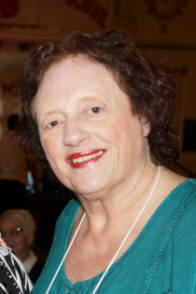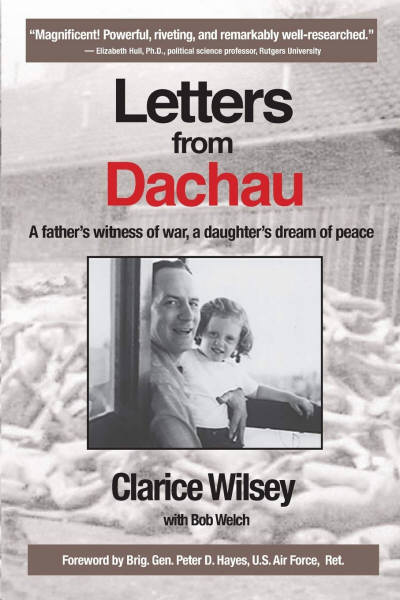By Jim Camden
jimc@spokesman.com
(360) 664-2598
The letters of a Spokane physician who helped liberate the Dachau concentration camp will be preserved for future generations by a Seattle museum with financial support from a New York City foundation.
The Holocaust Center for Humanity, which opened its museum last October, is archiving, scanning and transcribing the letters, and hopes to build an exhibit around them in about a year.
It's a window into the past, Dee Simon, executive director of the museum, said of the letters, which were described in a story in The Spokesman-Review last September.
Anesthesiologist David Wilsey wrote to his wife, Emily, from what he called dastardly Dachau about the conditions in the camp by the time his Army medical unit liberated it in 1945. He urged her to tell thousands about what he related, in hopes that they would eventually tell millions and that the horrors of the concentration camps would never be forgotten.
After leaving the Army, Wilsey and his family settled in Spokane, where he established his medical practice. He rarely spoke about his experiences after returning from the war, and the letters lay all but forgotten in a trunk in the attic of their South Hill home, until the Wilseys' adult children came across them and some other mementos from his time in Europe after both parents had died.
Their daughter, Clarice Wilsey, took the letters home to Eugene, Oregon, where she works as a career counselor at the University of Oregon. Although her father never talked to her about Dachau, some years earlier she had visited the Holocaust Museum in Washington, D.C., and was surprised to see her father in newsreel footage shown in an exhibit on that camp. But by then, her father had died and her mother flatly refused to go through the attic trunk that contained artifacts from the war.
Clarice Wilsey began reading the letters, and while the graphic details were so shocking they often brought her to tears, she was compelled to find a way to carry out her father's wish to tell people so the world would never forget.
After the story about the letters appeared in The Spokesman-Review, a director of the Peck Stacpoole Foundation in New York City read a version that ran in Stars and Stripes and contacted Clarice Wilsey. The foundation makes grants to a wide range of institutions for genealogy, historic preservation and art projects and offered to help preserve the letters. Because David Wilsey practiced for decades in Spokane, it was decided to keep the letters in Washington state.
The Holocaust Center for Humanity submitted a grant to the foundation and received $13,300 for the preservation of her father's letters, with the promise of more if it was needed, Wilsey said.
About half of the letters have been scanned by archivists and transcribed, or translated, from David Wilsey's cursive script, which today's youth might find difficult to read, Simon said. The scanned copies will be available to other museums, and the center hopes to display the originals as part of an exhibit that could feature other letters it has collected from residents of Europe who witnessed the escalation of Adolf Hitler's persecution of Jews and others.
We really want to make them public, Simon said. Our view is, if you preserve something and just have it in storage, it doesn't do any good.
At some point the Seattle center could bring the exhibit to Spokane, she added.
Letters provide an important view of history, because they record what a person sees and feels at the time, Simon said. But they often get lost or destroyed, or succeeding generations don't realize their importance and throw them away.
Finding such a complete set of observations as Wilsey's letters is kind of a miracle, she said.
I was amazed at the language, Simon said. The clarity of what he saw and what he felt he wasn't sugar-coating it.
Clarice Wilsey, meanwhile, has taken a class about teaching the Holocaust to middle and high school children and spoke at a remembrance day at the University of Oregon. After that she was contacted by a university professor who said his father, too, was a physician at Dachau, but that he'd never been able to talk to him about it.
In going through her father's photos with the professor, they found a picture of a group of soldiers with the two doctors standing next to each other in front of the Arc de Triomphe in Paris. It's one of the many strange connections she's made since deciding to work on her father's wish that people be told about the horrors of Dachau.
jimc@spokesman.com
(360) 664-2598
The letters of a Spokane physician who helped liberate the Dachau concentration camp will be preserved for future generations by a Seattle museum with financial support from a New York City foundation.
The Holocaust Center for Humanity, which opened its museum last October, is archiving, scanning and transcribing the letters, and hopes to build an exhibit around them in about a year.
It's a window into the past, Dee Simon, executive director of the museum, said of the letters, which were described in a story in The Spokesman-Review last September.
Anesthesiologist David Wilsey wrote to his wife, Emily, from what he called dastardly Dachau about the conditions in the camp by the time his Army medical unit liberated it in 1945. He urged her to tell thousands about what he related, in hopes that they would eventually tell millions and that the horrors of the concentration camps would never be forgotten.
After leaving the Army, Wilsey and his family settled in Spokane, where he established his medical practice. He rarely spoke about his experiences after returning from the war, and the letters lay all but forgotten in a trunk in the attic of their South Hill home, until the Wilseys' adult children came across them and some other mementos from his time in Europe after both parents had died.
Their daughter, Clarice Wilsey, took the letters home to Eugene, Oregon, where she works as a career counselor at the University of Oregon. Although her father never talked to her about Dachau, some years earlier she had visited the Holocaust Museum in Washington, D.C., and was surprised to see her father in newsreel footage shown in an exhibit on that camp. But by then, her father had died and her mother flatly refused to go through the attic trunk that contained artifacts from the war.
Clarice Wilsey began reading the letters, and while the graphic details were so shocking they often brought her to tears, she was compelled to find a way to carry out her father's wish to tell people so the world would never forget.
After the story about the letters appeared in The Spokesman-Review, a director of the Peck Stacpoole Foundation in New York City read a version that ran in Stars and Stripes and contacted Clarice Wilsey. The foundation makes grants to a wide range of institutions for genealogy, historic preservation and art projects and offered to help preserve the letters. Because David Wilsey practiced for decades in Spokane, it was decided to keep the letters in Washington state.
The Holocaust Center for Humanity submitted a grant to the foundation and received $13,300 for the preservation of her father's letters, with the promise of more if it was needed, Wilsey said.
About half of the letters have been scanned by archivists and transcribed, or translated, from David Wilsey's cursive script, which today's youth might find difficult to read, Simon said. The scanned copies will be available to other museums, and the center hopes to display the originals as part of an exhibit that could feature other letters it has collected from residents of Europe who witnessed the escalation of Adolf Hitler's persecution of Jews and others.
We really want to make them public, Simon said. Our view is, if you preserve something and just have it in storage, it doesn't do any good.
At some point the Seattle center could bring the exhibit to Spokane, she added.
Letters provide an important view of history, because they record what a person sees and feels at the time, Simon said. But they often get lost or destroyed, or succeeding generations don't realize their importance and throw them away.
Finding such a complete set of observations as Wilsey's letters is kind of a miracle, she said.
I was amazed at the language, Simon said. The clarity of what he saw and what he felt he wasn't sugar-coating it.
Clarice Wilsey, meanwhile, has taken a class about teaching the Holocaust to middle and high school children and spoke at a remembrance day at the University of Oregon. After that she was contacted by a university professor who said his father, too, was a physician at Dachau, but that he'd never been able to talk to him about it.
In going through her father's photos with the professor, they found a picture of a group of soldiers with the two doctors standing next to each other in front of the Arc de Triomphe in Paris. It's one of the many strange connections she's made since deciding to work on her father's wish that people be told about the horrors of Dachau.
Clarice Wilsey, left, along with her lifelong friends Carol Wanamaker, center, and Pam Blackwell Raasch, views some of the letters written by Clarisa's father, David Wilsey. Wilsey, an anesthesiologist in Spokane, was in the first group of Army docs who entered the Dachau Concentration Camp in May 1945. Wilsey wrote almost daily letters to his wife, Emily, during the war, although when they got to Dachau the letters slowed down a bit. They described the conditions there in great detail. His wife kept the letters in a trunk along with some things Wilsey brought back from the war. They moved to Spokane in the late 1940s and raised three kids, whom he never told about his time at Dachau. He was active in several things, including Physicians for Social Responsibility, the Nishinomiya Sister City organization and the anti-Waste-to-Energy movement. He died in the 1990s and Emily died in 2008. When cleaning out the house for sale, the grown kids came across the letters. 8/17/15 DAN PELLE danp@spokesman.com (Dan Pelle / The Spokesman-Review)
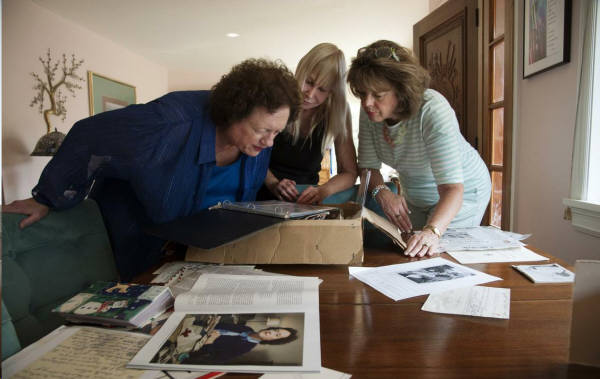

Capt. David Wilsey wrote home, in letters pictured here, about his experiences at Dachau concentration camp. Now, letters of the Spokane physician who helped liberate the camp will be preserved by a Seattle museum with financial support from a New York City foundation. (Dan Pelle / The Spokesman-Review)
By Jim Camden
jimc@spokesman.com
(360) 664-2598
A Spokane man witnessed the horrors of a Nazi concentration camp, but his children knew little of it until they discovered his letters home
It may have been chance that brought Clarice Wilsey face-to-face with her late father's role in the liberation of Dachau. Or maybe it was fate.
Nearly 10 years ago, Wilsey was visiting the Washington, D.C., area and took the Metro into the city, planning to see the Smithsonian. Instead, she got off at the stop for the Holocaust Museum when she heard other people talking about it.
Inside the museum, there were long lines for some exhibits, but a man motioned her to an elevator with no line. She rode up to the fourth floor and walked into an exhibit on Dachau, where a newsreel clip showed scenes of the U.S. Army after troops entered the concentration camp. A young American captain walked across the screen with a serious, pensive look, in front of a group of recently liberated prisoners.
She thought she recognized the look, and became more convinced as she watched the newsreel over and over. She was sure the man on the screen was her father, David Wilsey, who had come home from the war, raised three children in Spokane, built a successful medical practice, and become involved in a range of local issues including the Sister City organization and the Waste-to-Energy controversy.
He never talked at length about his war experiences especially to his children, even after they were grown. She was only vaguely aware her father had been at Dachau. He died in 1996.
She didn't know he had left behind a first-person account of that dark chapter of history, one that's getting international attention for its volume and disturbing details.
As Nazi Germany fell 70 years ago, the world slowly grasped the horror of Adolf Hitler's concentration camps. Dachau, opened in 1933, was the first of the camps, where the Third Reich killed Jews, Gypsies and others deemed unworthy of Hitler's Aryan vision.
By the time the U.S. 7th Army liberated Dachau on April 29, 1945, about 188,000 prisoners had passed through its gates; some were sent on to other camps and thousands died there of disease, starvation or medical experiments. Some were worked to death in the munitions factories and others were executed by guards, although historians believe none were murdered in Dachau's gas chambers, as they were at other camps.
The first American doctors to enter the camp were with the 116th Evacuation Hospital, which included a 30-year-old anesthesiologist named David Wilsey who was writing almost daily letters home to his wife, Emily. The letters slowed when Wilsey reached what he came to call dastardly Dachau, and contained dark details of typhus and torture endured by the camp's inhabitants.
At one point, he wrote, maybe the best thing would be to burn it all down.
Allied generals were so horrified by the carnage in the concentration camps that their commander-in-chief, Gen. Dwight Eisenhower, would soon visit Dachau, accompanied by reporters and photographers. The stories and images from those visits shocked a world that already had lived through nearly six years of war.
In one letter, David urged Emily to tell thousands, so millions would eventually know, and the world would never forget what happened in the camps.
David Wilsey was dead by the time his adult daughter caught a glimpse of him in the newsreel footage at the Holocaust museum, but she called her mother to tell of the discovery.
All she said was Oh. That's interesting,? Clarice Wilsey recalled.
Emily Wilsey had kept the letters her husband sent in a trunk. Other trunks contained pictures and items he brought back from the war. They gathered dust in the attic; the children sometimes played around them, but never opened them.
Clarice had seen a few of those items, pictures from Dachau, as a young girl when the family moved from a house on 23rd Avenue to another on Ballou Road. They were in a box that was being moved, and she picked them up to look at them. What she remembers most about the pictures is her father getting angry when she asked about them.
These are not for little girls, he shouted as he took them away.
After seeing the newsreel footage at the museum, Clarice asked her mother if they could open the trunk. Emily Wilsey said no. The subject was closed.
After Emily died in 2008, Clarice and her siblings Terry and Sharon returned to Spokane to clean out their parents� home and ready it for sale. Terry, the oldest of the three, came across one trunk in the attic that contained some medical instruments from their father's time in the Army, some photos and a large Nazi flag. He lowered the flag from the ceiling, and it reached nearly to the floor. His sisters were horrified; none had ever seen the flag before.
In another trunk was a box with stacks of letters. There wasn't time to read them, so Clarice packed them up and took them with her to Eugene, where she works as a career counselor at the University of Oregon. The following November, when the three siblings were together for Thanksgiving, Clarice brought some of them out. Sharon said she and Clarice cried a lot that evening, and she still gets emotional talking about the letters.
There was a lot of hard stuff in those letters about his experiences. The whole thing was so horrific, it's hard imagining him there, she said.
David Wilsey's letters from Dachau tell of smells from the crematory worse than any he'd experienced as an orderly or doctor, so bad my stomach contents were way up in my esophagus.
He related stories of torture that former prisoners recounted, like the escapee who was tied to a stake while the camp guard dogs tore him apart. When the camp was liberated, one of the first things the former prisoners did was shoot the dogs and their handler, he wrote.
American soldiers were so appalled at what they found at Dachau they lined up SS guards against the wall because they had it coming, Wilsey wrote, or later forced guards to stand with arms raised like Nazi salutes for hours before executing them.
He stayed more than a month at Dachau, where Allied medical staff did what they could for the survivors. His letters continued, and in one he asked Emily not to be angry that he passed up an opportunity to come home. He explained there were too many people in need of anesthesia for the surgeries they were going to get. His belief in God and his Hippocratic Oath wouldn't let him leave. He used the term holocaust regularly, before that became a common term for Hitler's genocide.
The Dachau letters differed somewhat from letters earlier in the war, which interspersed humorous stories of trying to cope with the mud and constant movements of the hospital unit with questions about his infant son and advice to his wife.
I think one of the things he lost was his sense of humor, Clarice Wilsey said. I grew up with a serious father.
He returned from the war to Emily and infant son Terry, who were living in North Dakota. They moved to Minnesota and later to Spokane, where he became part of an anesthesiology group practice. Like many returning veterans, he apparently got on with life, family and community.
He was a leader for Boy Scouts and Explorers when Terry was in those organizations, was active in the St. John�s Episcopal Cathedral congregation and later a founding member of St. Stephen�s Episcopal Church. He and Emily were instrumental in the building of St. Stephen�s healing chapel, where the inscription talks of the intercession of medicine and the power of God in prayer.
When Spokane began exploring the prospects of its first Sister City relationship with Nishinomiya, Japan, Wilsey enthusiastically joined the effort and later became involved in the planning for the Japanese Garden in Manito Park.
He was also a member of Physicians for Social Responsibility, vocal in his criticism of nuclear proliferation and a plan in the mid-1980s to bring the MX missile to Fairchild Air Force Base near Spokane. Later he joined the opposition to the Waste-to-Energy Plant when that facility was being proposed for the West Plains.
He spoke little of his war experiences. I can't remember hearing anything much other than Father was at Dachau and Dachau was horrible,? Terry said recently.
Bob Lamp, who first met Wilsey as a teen and lived across the street from him for decades, remembers him as a marvelous guy with whom there was no such thing as a short conversation. Lamp was aware Wilsey had been at Dachau, but his neighbor never said anything about his time there. The only hint of the experience was when Lamp, as a young Army officer, talked of escorting the body of a soldier from Vietnam back to his family. Wilsey told him, ?It's a wonderful thing to be able to do. I did it in a different way,? Lamp, now a retired attorney, recalled.
Wilsey's children remember only two clues of their father�s feelings about his time at Dachau.
I remember him getting so angry whenever people tried to deny the Holocaust, Sharon said.
And when the movie Schindler's List was released in 1993, he was obsessed with it, Clarice said. But still he wouldn't talk to her about his experiences.
He would clam up about it. He didn't want his daughter to know these ugly facts, she said.
Although David Wilsey didn't talk about Dachau, he and Emily kept the letters he sent her from the war, along with the other mementos their children found after both had died. Those items were kept through at least four moves over 50 years.
Maybe the letters were just placed in a box in a trunk and forgotten. Clarice Wilsey thinks they were kept in hopes that someone would find them and do what her father once urged her mother to do: Tell thousands about Dachau so millions will know. She and her siblings want to fulfill his wishes that no one forgets.
Clarice said she's working her way through the letters, but it's slow going: When I first started, they were so graphic; I never cried so hard in my life. I couldn't read them for a while. Now I try to read a couple a day.
She began exploring options for donating the letters to a museum or a repository, and has received increased interest since a feature article about the letters appeared in the New Republic in May.
Historians quoted by the magazine say Wilsey's letters represent a firsthand account, possibly unique in terms of its volume, of the toll of war and its aftermath on the soldiers, the prisoners and the German population.
Clarice has talked with the Holocaust Museum in Washington, D.C.; another in Skokie, Illinois; the Simon Wiesenthal Center in Los Angeles and the Oregon Jewish Museum, as well as some university history departments. She wants to make sure her father's letters won't get set aside for years in some repository's vast collection and is holding off on a final decision until she's read through all of them.
I really feel I have a calling to be that voice, she said.
jimc@spokesman.com
(360) 664-2598
A Spokane man witnessed the horrors of a Nazi concentration camp, but his children knew little of it until they discovered his letters home
It may have been chance that brought Clarice Wilsey face-to-face with her late father's role in the liberation of Dachau. Or maybe it was fate.
Nearly 10 years ago, Wilsey was visiting the Washington, D.C., area and took the Metro into the city, planning to see the Smithsonian. Instead, she got off at the stop for the Holocaust Museum when she heard other people talking about it.
Inside the museum, there were long lines for some exhibits, but a man motioned her to an elevator with no line. She rode up to the fourth floor and walked into an exhibit on Dachau, where a newsreel clip showed scenes of the U.S. Army after troops entered the concentration camp. A young American captain walked across the screen with a serious, pensive look, in front of a group of recently liberated prisoners.
She thought she recognized the look, and became more convinced as she watched the newsreel over and over. She was sure the man on the screen was her father, David Wilsey, who had come home from the war, raised three children in Spokane, built a successful medical practice, and become involved in a range of local issues including the Sister City organization and the Waste-to-Energy controversy.
He never talked at length about his war experiences especially to his children, even after they were grown. She was only vaguely aware her father had been at Dachau. He died in 1996.
She didn't know he had left behind a first-person account of that dark chapter of history, one that's getting international attention for its volume and disturbing details.
As Nazi Germany fell 70 years ago, the world slowly grasped the horror of Adolf Hitler's concentration camps. Dachau, opened in 1933, was the first of the camps, where the Third Reich killed Jews, Gypsies and others deemed unworthy of Hitler's Aryan vision.
By the time the U.S. 7th Army liberated Dachau on April 29, 1945, about 188,000 prisoners had passed through its gates; some were sent on to other camps and thousands died there of disease, starvation or medical experiments. Some were worked to death in the munitions factories and others were executed by guards, although historians believe none were murdered in Dachau's gas chambers, as they were at other camps.
The first American doctors to enter the camp were with the 116th Evacuation Hospital, which included a 30-year-old anesthesiologist named David Wilsey who was writing almost daily letters home to his wife, Emily. The letters slowed when Wilsey reached what he came to call dastardly Dachau, and contained dark details of typhus and torture endured by the camp's inhabitants.
At one point, he wrote, maybe the best thing would be to burn it all down.
Allied generals were so horrified by the carnage in the concentration camps that their commander-in-chief, Gen. Dwight Eisenhower, would soon visit Dachau, accompanied by reporters and photographers. The stories and images from those visits shocked a world that already had lived through nearly six years of war.
In one letter, David urged Emily to tell thousands, so millions would eventually know, and the world would never forget what happened in the camps.
David Wilsey was dead by the time his adult daughter caught a glimpse of him in the newsreel footage at the Holocaust museum, but she called her mother to tell of the discovery.
All she said was Oh. That's interesting,? Clarice Wilsey recalled.
Emily Wilsey had kept the letters her husband sent in a trunk. Other trunks contained pictures and items he brought back from the war. They gathered dust in the attic; the children sometimes played around them, but never opened them.
Clarice had seen a few of those items, pictures from Dachau, as a young girl when the family moved from a house on 23rd Avenue to another on Ballou Road. They were in a box that was being moved, and she picked them up to look at them. What she remembers most about the pictures is her father getting angry when she asked about them.
These are not for little girls, he shouted as he took them away.
After seeing the newsreel footage at the museum, Clarice asked her mother if they could open the trunk. Emily Wilsey said no. The subject was closed.
After Emily died in 2008, Clarice and her siblings Terry and Sharon returned to Spokane to clean out their parents� home and ready it for sale. Terry, the oldest of the three, came across one trunk in the attic that contained some medical instruments from their father's time in the Army, some photos and a large Nazi flag. He lowered the flag from the ceiling, and it reached nearly to the floor. His sisters were horrified; none had ever seen the flag before.
In another trunk was a box with stacks of letters. There wasn't time to read them, so Clarice packed them up and took them with her to Eugene, where she works as a career counselor at the University of Oregon. The following November, when the three siblings were together for Thanksgiving, Clarice brought some of them out. Sharon said she and Clarice cried a lot that evening, and she still gets emotional talking about the letters.
There was a lot of hard stuff in those letters about his experiences. The whole thing was so horrific, it's hard imagining him there, she said.
David Wilsey's letters from Dachau tell of smells from the crematory worse than any he'd experienced as an orderly or doctor, so bad my stomach contents were way up in my esophagus.
He related stories of torture that former prisoners recounted, like the escapee who was tied to a stake while the camp guard dogs tore him apart. When the camp was liberated, one of the first things the former prisoners did was shoot the dogs and their handler, he wrote.
American soldiers were so appalled at what they found at Dachau they lined up SS guards against the wall because they had it coming, Wilsey wrote, or later forced guards to stand with arms raised like Nazi salutes for hours before executing them.
He stayed more than a month at Dachau, where Allied medical staff did what they could for the survivors. His letters continued, and in one he asked Emily not to be angry that he passed up an opportunity to come home. He explained there were too many people in need of anesthesia for the surgeries they were going to get. His belief in God and his Hippocratic Oath wouldn't let him leave. He used the term holocaust regularly, before that became a common term for Hitler's genocide.
The Dachau letters differed somewhat from letters earlier in the war, which interspersed humorous stories of trying to cope with the mud and constant movements of the hospital unit with questions about his infant son and advice to his wife.
I think one of the things he lost was his sense of humor, Clarice Wilsey said. I grew up with a serious father.
He returned from the war to Emily and infant son Terry, who were living in North Dakota. They moved to Minnesota and later to Spokane, where he became part of an anesthesiology group practice. Like many returning veterans, he apparently got on with life, family and community.
He was a leader for Boy Scouts and Explorers when Terry was in those organizations, was active in the St. John�s Episcopal Cathedral congregation and later a founding member of St. Stephen�s Episcopal Church. He and Emily were instrumental in the building of St. Stephen�s healing chapel, where the inscription talks of the intercession of medicine and the power of God in prayer.
When Spokane began exploring the prospects of its first Sister City relationship with Nishinomiya, Japan, Wilsey enthusiastically joined the effort and later became involved in the planning for the Japanese Garden in Manito Park.
He was also a member of Physicians for Social Responsibility, vocal in his criticism of nuclear proliferation and a plan in the mid-1980s to bring the MX missile to Fairchild Air Force Base near Spokane. Later he joined the opposition to the Waste-to-Energy Plant when that facility was being proposed for the West Plains.
He spoke little of his war experiences. I can't remember hearing anything much other than Father was at Dachau and Dachau was horrible,? Terry said recently.
Bob Lamp, who first met Wilsey as a teen and lived across the street from him for decades, remembers him as a marvelous guy with whom there was no such thing as a short conversation. Lamp was aware Wilsey had been at Dachau, but his neighbor never said anything about his time there. The only hint of the experience was when Lamp, as a young Army officer, talked of escorting the body of a soldier from Vietnam back to his family. Wilsey told him, ?It's a wonderful thing to be able to do. I did it in a different way,? Lamp, now a retired attorney, recalled.
Wilsey's children remember only two clues of their father�s feelings about his time at Dachau.
I remember him getting so angry whenever people tried to deny the Holocaust, Sharon said.
And when the movie Schindler's List was released in 1993, he was obsessed with it, Clarice said. But still he wouldn't talk to her about his experiences.
He would clam up about it. He didn't want his daughter to know these ugly facts, she said.
Although David Wilsey didn't talk about Dachau, he and Emily kept the letters he sent her from the war, along with the other mementos their children found after both had died. Those items were kept through at least four moves over 50 years.
Maybe the letters were just placed in a box in a trunk and forgotten. Clarice Wilsey thinks they were kept in hopes that someone would find them and do what her father once urged her mother to do: Tell thousands about Dachau so millions will know. She and her siblings want to fulfill his wishes that no one forgets.
Clarice said she's working her way through the letters, but it's slow going: When I first started, they were so graphic; I never cried so hard in my life. I couldn't read them for a while. Now I try to read a couple a day.
She began exploring options for donating the letters to a museum or a repository, and has received increased interest since a feature article about the letters appeared in the New Republic in May.
Historians quoted by the magazine say Wilsey's letters represent a firsthand account, possibly unique in terms of its volume, of the toll of war and its aftermath on the soldiers, the prisoners and the German population.
Clarice has talked with the Holocaust Museum in Washington, D.C.; another in Skokie, Illinois; the Simon Wiesenthal Center in Los Angeles and the Oregon Jewish Museum, as well as some university history departments. She wants to make sure her father's letters won't get set aside for years in some repository's vast collection and is holding off on a final decision until she's read through all of them.
I really feel I have a calling to be that voice, she said.

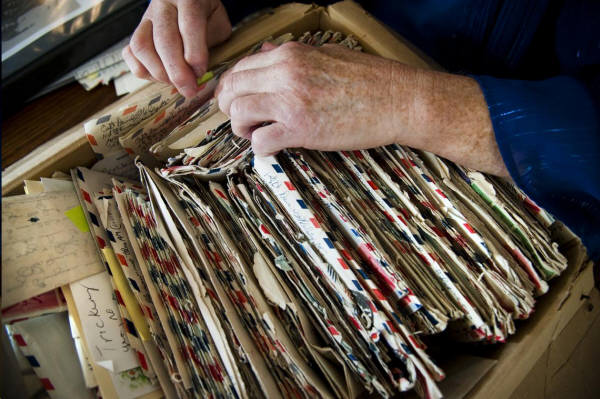
Clarice Wilsey pores over a box of letters written by her father, David Wilsey, Aug. 17, 2015. Wilsey, an anesthesiologist in Spokane, was in the first group of Army docs who entered the Dachau Concentration Camp in May 1945. David Wilsey wrote almost daily letters to his wife during the war, describing the conditions there in great detail. (Dan Pelle / The Spokesman-Review)
Clarice Wilsey, then age 3, poses with her father, David Wilsey, in a family photo.
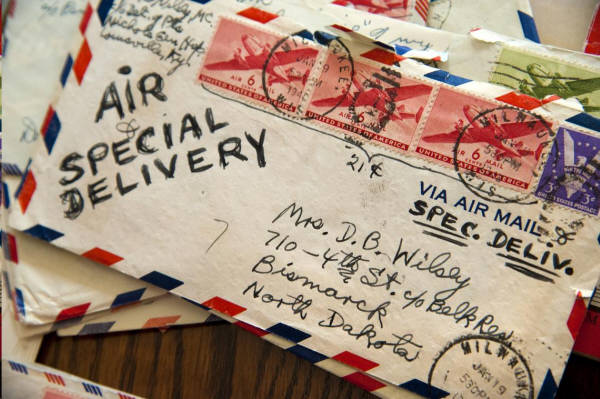
Capt. David Wilsey wrote home about his experiences at Dachau Concentration Camp (Dan Pelle)
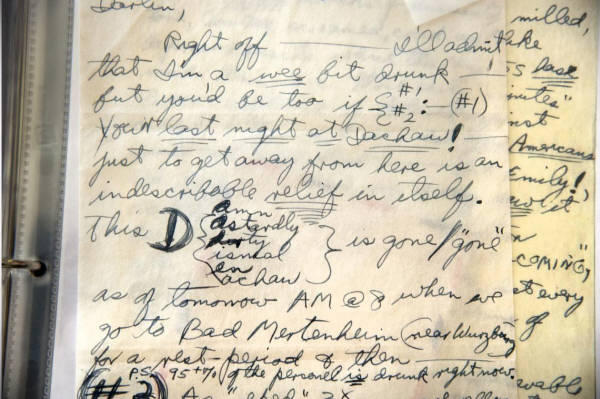
Clarice Wilsey says she is slowly making her way through her father’s letters home. Some are far more disturbing than others. (Dan Pelle)
Clarice Wilsey
has been presented the following prestigious awards:
Esther Matthews Award ….Highest Award from the Oregon Career Development Association for leadership, scholarship and contributions to the career development field
Anne Leavitt Award… highest award in the Division of Student Life for making significant contributions in the lives of students at U of O
has been presented the following prestigious awards:
Esther Matthews Award ….Highest Award from the Oregon Career Development Association for leadership, scholarship and contributions to the career development field
Anne Leavitt Award… highest award in the Division of Student Life for making significant contributions in the lives of students at U of O
Letters from Dachau
A heartfelt memoir written by the daughter of a U.S. physician who, in World War II, was among the first doctors to provide medical care for the liberated survivors at the Dachau Concentration Camp in Germany. Dr. David Wilsey was a brilliant anesthetist a member of the Alpha Omega Alpha honorary medical society who, in October 1944, left his wife, Emily, and infant son, "Thumper," to serve in France with the 116th Evacuation Hospital. While serving there, and in Germany, Wilsey wrote more than 300 letters to his wife, documenting his often-horrific experiences, which, in Dachau, included patients who'd been tortured and starved by the Nazis. One letter said, "War & Dachau change lots of things that you will have to just see for yourself. His prophesy proved true; after his return home, Wilsey was never the same. In a heartfelt memoir told through the eyes of a daughter, Clarice Wilsey writes of Dachau, war, and the heroic man she never knew. It is a story of heroism in the face of cruelty and how the wounds of experiencing such sometimes never heal. Writes Dee Simon, executive director of the Holocaust Center for Humanity in Seattle: "Wilsey shares with startling openness the deepest thoughts of a man plunged into one of the world's most horrific crimes. She reflects on this crucial history as a daughter raised in the shadow of trauma."
A heartfelt memoir written by the daughter of a U.S. physician who, in World War II, was among the first doctors to provide medical care for the liberated survivors at the Dachau Concentration Camp in Germany. Dr. David Wilsey was a brilliant anesthetist a member of the Alpha Omega Alpha honorary medical society who, in October 1944, left his wife, Emily, and infant son, "Thumper," to serve in France with the 116th Evacuation Hospital. While serving there, and in Germany, Wilsey wrote more than 300 letters to his wife, documenting his often-horrific experiences, which, in Dachau, included patients who'd been tortured and starved by the Nazis. One letter said, "War & Dachau change lots of things that you will have to just see for yourself. His prophesy proved true; after his return home, Wilsey was never the same. In a heartfelt memoir told through the eyes of a daughter, Clarice Wilsey writes of Dachau, war, and the heroic man she never knew. It is a story of heroism in the face of cruelty and how the wounds of experiencing such sometimes never heal. Writes Dee Simon, executive director of the Holocaust Center for Humanity in Seattle: "Wilsey shares with startling openness the deepest thoughts of a man plunged into one of the world's most horrific crimes. She reflects on this crucial history as a daughter raised in the shadow of trauma."
(Click for Home)
